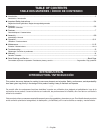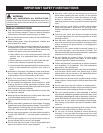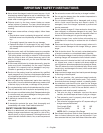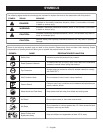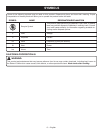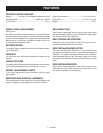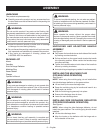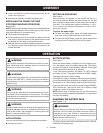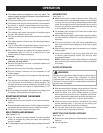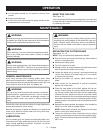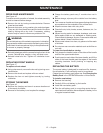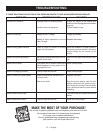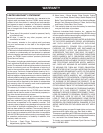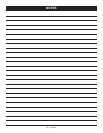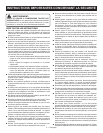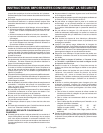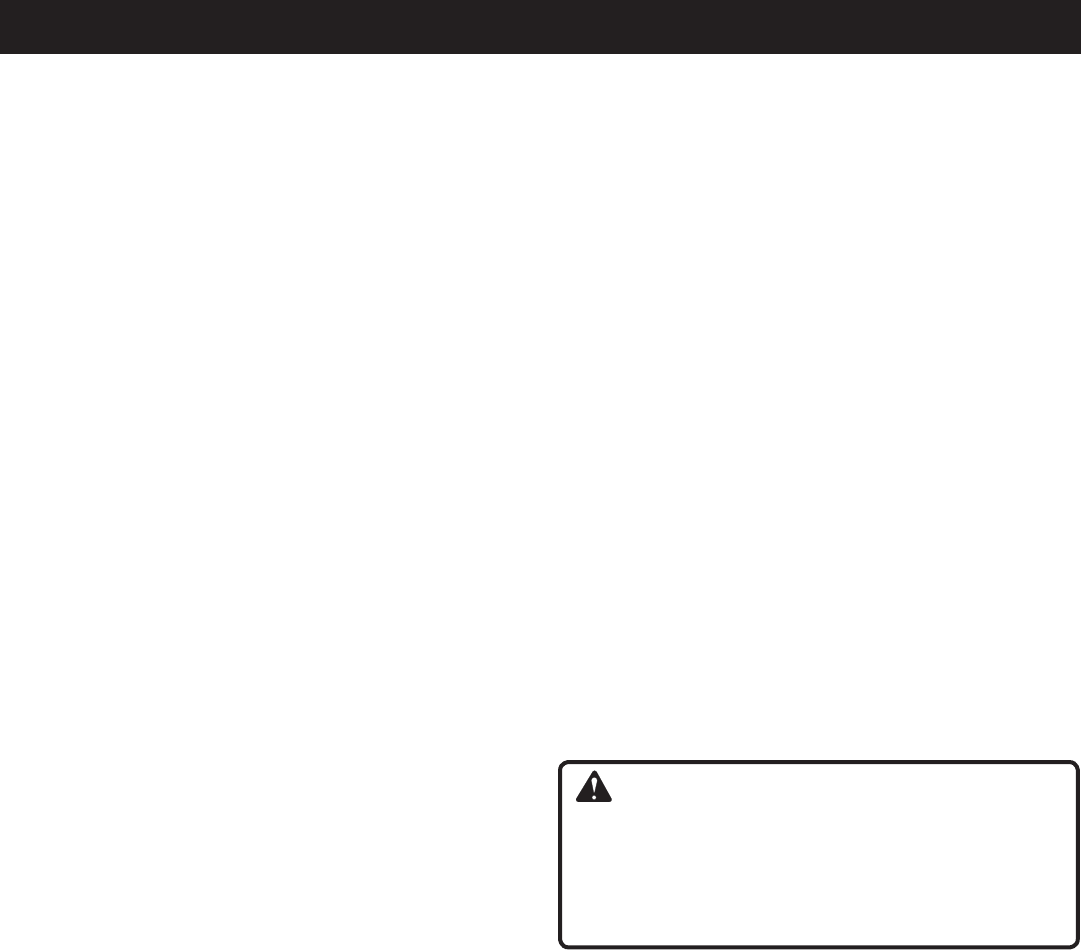
10 — English
OPERATION
The battery should be charged in a cool, dry place. The
battery charger should be operated in temperatures be-
tween 23
°F and 104°F
.
Charge the battery pack only with the charger provided.
The battery pack may be charged while it is connected to
the mower, or while it is disconnected from the mower.
Allow at least 10-12 hours of charge time before initial
use of the mower.
The charger may remain connected to the battery pack
any time the mower is not in use.
To improve battery life, store battery indoors in a controlled
climate.
The battery does not have to be fully discharged before
recharging.
Two to three initial charging/discharging cycles may be
requiredtoachievemaximumruntime/capacity.
When fully charged, the battery can be safely stored in
temperatures down to -40
°F for a period of up to two
weeks, before it requires charging
.
To charge:
Make sure the power supply is normal household voltage,
120 volts, AC only, 60 Hz.
Remove the
fuse key and store in separate location out
of reach of children
.
Remove the cover from the battery receptacle.
Plug the charger connector into the receptacle on the
mower battery.
Insert the 120 volt plug of the charger into the wall recep-
tacle.
The red light on the charger should come on, indicating
you have power and the battery is being charged. The
red light should go off when charging is complete. A fully
dischargedmowerwill chargeinapproximately10-12
hours.
When charging is complete, disconnect the charger from
the battery, and replace the receptacle cover.
STARTING/STOPPING THE MOWER
See Figures 9 - 10.
Insert the fuse key into the slot on the motor/shroud as-
sembly.
Press and hold the start button. Pull the upper bail toward
the handle and release the button to start the mower.
To stop the mower, release the upper bail.
SELF-PROPELLED MOWING
See Figures 9 - 10.
Once the mower has been started, the self-propelled
feature is engaged by pulling the lower bail upward to
meet the handle.
To disengage the self-propelled feature, release the lower
bail.
MOWING TIPS
See Figure 11.
Make sure the lawn is clear of stones, sticks, wires, and
other objects that could damage the lawn mower blades
or motor. Do not mow over property stakes or other metal
posts. Such objects could be accidentally thrown by the
mower in any direction and cause serious personal injury
to the operator and others.
For a healthy lawn, always cut off one-third or less of the
total length of the grass.
When cutting heavy grass, reduce walking speed to allow
for more effective cutting and a proper discharge of the
clippings.
Do not cut wet grass. It will stick to the underside of the
deck and prevent proper bagging or mulching of grass
clippings.
New or thick grass may require a narrower cut or a higher
cutting height.
Clean the underside of the mower deck after each use
to remove grass clippings, leaves, dirt, and any other
accumulated debris.
NOTE: Always stop mower, allow blades to completely
stop, and remove the fuse key before cleaning unerneath
the mower.
SLOPE OPERATION
WARNING:
Slopes are a major factor related to slip and fall accidents
that can result in severe injury. Operation on slopes
requiresextracaution.Ifyoufeeluneasyonaslope,do
not mow it. For your safety, do not attempt to mow slopes
greater than 15 degrees.
Mowacrossthefaceofslopes,notupanddown.Exercise
extremecautionwhenchangingdirectiononslopes.
Watch for holes, ruts, rocks, hidden objects, or bumps
which can cause you to slip or trip. Tall grass can hide ob-
stacles. Remove all objects such as rocks, tree limbs, etc.,
which could be tripped over or thrown by the blade.
Always be sure of your footing. A slip and fall can cause
serious personal injury. If you feel you are losing your
balance, release the upper bail immediately.
Do not mow near drop-offs, ditches, or embankments;
you could lose your footing or balance.
EMPTYING THE GRASS CATCHER
See Figure 12.
Stop mower, allow blades to completely stop, and remove
fuse key.
Lift the rear door.



